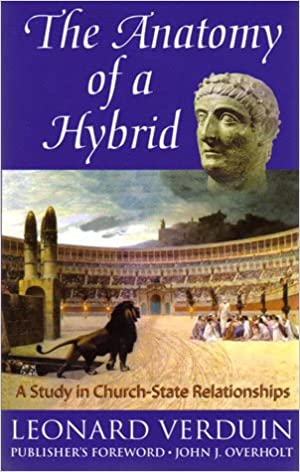A Brief Book Summary from Books At a Glance
By Steve West
About the Author
Leonard Verduin was the pastor of Campus Chapel at the University of Michigan from 1941 until his retirement in 1962. Besides translation of the complete works of Menno Simons, his publications include The Reformers and Their Stepchildren and Somewhat Less Than God.
Introduction
In this book Verduin argues that the New Testament teaching on the separation of church and state was lost during the time of Constantine. He further argues that the Reformers perpetuated the unbiblical union of the state and church, with the state using the sword to enforce the church’s teachings. Verduin insists that the Scriptures give separate roles to the church and the state, and that everyone should have freedom of religion and conscience.
Table of Contents
Part One “The Daughters of Men”
Part Two “Sons of God”
Part Three “The Birth of the Hybrid”
Part Four “And Also Afterward”
Episode One
Episode Two
Postscript
Appendix
Summary
Part One: “The Daughters of Men”
Pre-Christian societies are sacral, where unity is found on the basis of shared religious views and rites. In such societies there can be no separation of church and state since they are inseparably tied together. In the Bible, Babylon, Ninevah, and Ephesus show the workings of sacral societies—in each case worship, obedience, and politics were unified. Sacral societies could be polytheistic, as long as each god was recognized as valid. Christians were persecuted because they refused to worship deities other than the Lord: if they had worshiped the Lord as one among other gods, there would have been no difficulties. In a sacral society, sacrament and ritual are more important than doctrine. When external act and ritual is all that is required, people can be coerced into performing religious activities. In Christianity, however, the focus is on internal belief, so coercing someone to perform a Christian religious act is illogical. Sacral societies lack missionary impulses.
In sacramental societies, the sacraments draw people together, unifying politics and religion. Private religious acts, therefore, are not important (and may be frowned upon) since the goal is public unity. As a result, individuals are subsumed under the group. Early Israel in the Old Testament had many features of a sacramental society. People born into Israel were part of the cultic-state, and there was no toleration for religious diversity. As Israel progressed, however, the spheres of the king and the priest were strongly differentiated, leading towards a composite society where the state and religion were separable. In a composite society, people are united in the state, but they can take different views of religion. Kings Saul and Uzziah illustrate the inability of the king to perform priestly functions. God operates with a plan of progressive grace, revealing his ways more clearly as time goes on. “Conserving” or “common” grace is “preliminary” grace, and “special” or “redeeming” grace is “subsequent” grace. The state is a creature of preliminary grace; the sword has a conserving function. The state will not go into the eschatological age. There is no such thing as a Christian state, since such a state would have to consist entirely of believers. Christians are to influence the state and public opinion, but they are not to coerce. Missions and the proclamation of the gospel did not emerge from preliminary grace, but rather from the revelation of subsequent grace.
Part Two: “Sons of God”
Over time, God revealed to Israel that they needed to look to the nations, leading others to God. The Book of Jonah shows how much this could be resisted. God also began to reveal that he looked for circumcision of the heart, rather than just in the flesh: there was a true Israel in Israel. When Judah went into exile to Babylon, God told them to submit to the king and pray for the city. This required that the Jews separate their cult from the state, submitting to the king while reserving their worship for Yahweh alone. Even when the exiles returned, the temple they built was poor, and they were stilled ruled by pagans until the New Testament times. Synagogues were outside of the temple system, and also not controlled directly by government. This attracted proselytes, people who worshiped and learned about God, but who were still loyal to the pagan government.
[To continue reading this summary, please see below....]The remainder of this article is premium content. Become a member to continue reading.
Already have an account? Sign In
